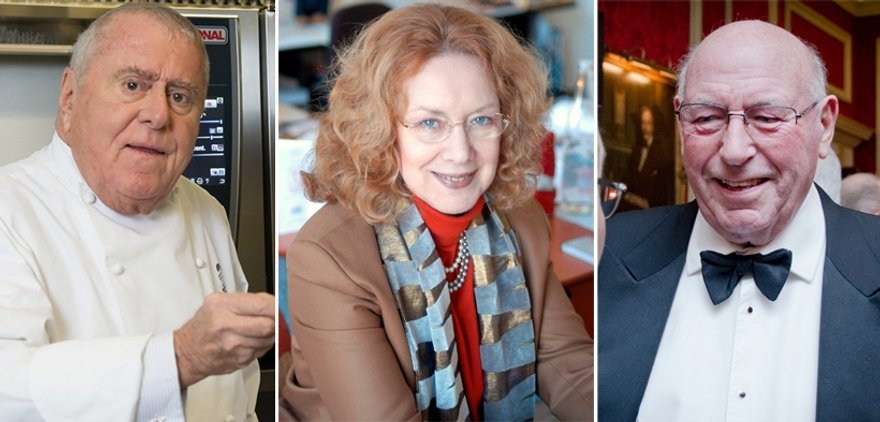As 2021 draws to a close, we look back at what has been a turbulent year for the hospitality industry. Here are the most popular stories on www.thecaterer.com.
Michelin magic
The year kicked off with the delayed and much-anticipated launch of The Michelin Guide for Great Britain and Ireland. Hélène Darroze at the Connaught and Core by Clare Smyth in London were both awarded Michelin's highest honour of three stars at the postponed ceremony.
Smyth said: "We worked hard every day to be the best that we can. We try to be better every day than the last. Obviously it's my dream to reach this level, but you could never imagine it would happen. It's incredible."
A clutch of new one-star restaurants were also unveiled, including Tom Aiken's Muse in London's Belgravia, Shaun Rankin at Grantley Hall and Restaurant Hjem in Northumberland. Three restaurants were awarded two Michelin stars: Restaurant Story, A Wong and Da Terra, all in London.
Chartwells faces online backlash
Compass Group's education catering arm Chartwells faced an online backlash after an image of a free school meal bag deemed inadequate went viral.
The bag, which was supposed to provide lunches for a child for five days, was described by footballer and child hunger campaigner Marcus Rashford as "unacceptable" and branded "disgraceful" by prime minister Boris Johnson. Managing director Charlie Brown would later apologise unreservedly in an interview with The Caterer and explain what had happened. He said Compass found out schools were closing at "very, very short notice". In the first week the caterer put together 18,000 parcels, but it estimated that about 500 were affected by supply chain problems.
February frustrations
Come February, frustrations were running high as Boris Johnson revealed that hospitality would not reopen until at least March (in fact, it would be May before venues could open for indoor custom).
Later in the month pub bosses pulled out of talks with business minister Paul Scully over what Young's boss Patrick Dardis described as an "obvious lack of interest and respect".
Dardis said that the sector was "shocked and appalled" that the government was basing its decisions to keep pubs closed on "unfounded and unproven statistics", and described its "refusal to acknowledge" that its approach had led to people meeting in their own homes rather than controlled hospitality environments "wilfully and dangerously ignorant".
No reopening but some relief
March did not bring a reopening but some comfort was served up as chancellor Rishi Sunak confirmed the furlough scheme would be extended until the end of September.
The government also told local authorities to begin distributing restart grants to businesses "as soon as possible" from the beginning of April, just two weeks before restrictions were to be relaxed to allow outdoor dining.
Where are the staff?
Hospitality businesses struggled to find staff as they reopened for outdoor custom, with one chef describing recruitment as "impossible".
According to the Office for National Statistics, the hospitality sector had lost 355,000 paid employees in the year to March 2021, over three-quarters of whom were under the age of 35.
Business owners spoke of candidates not turning up to interviews or even leaving the country before their shifts were due to start, as it transpired Brexit and the pandemic had caused many to leave the industry or return overseas.
Sir Richard Sutton murdered
Sir Richard Sutton, owner of the freehold of London's Athenaeum and Sheraton Grand Park Lane hotels, was stabbed to death in his Dorset home in April.
A statement from Sir Richard's company said: "We are deeply saddened and devastated by the sudden death of Sir Richard Sutton, announced this morning. Sir Richard was a caring, generous and warm family man, who genuinely regarded those who worked for him as part of his extended family."
Thomas Schreiber, of Gillingham, Dorset, appeared at Winchester Crown Court accused of the murder of the 83-year-old baronet, and attempted murder of his mother Anne Schreiber. The attack happened at Sir Richard's Moorhill estate, which he shared with the Schreiber family following the separation of the defendant's parents. As The Caterer went to press the trial was ongoing.
The doors open (finally)
On 17 May hospitality finally reopened for indoor custom, albeit with social distancing and table service restrictions.
Diners and drinkers once again took their seats to enjoy the warmest hospitality that current government guidelines would allow, with the promise that 21 June would see all legal limits on social contact lifted, if transmission rates allowed.
However, for many the 17 May did not see doors reopen, with UKHospitality estimating some 10% of hospitality businesses had not survived the pandemic. On top of this, staffing shortages, ongoing disputes over insurance and rent payments, and the impending lifting of any government support meant no one could rest on their laurels.
The ‘pingdemic'
The summer months brought yet another challenge as the ‘pingdemic' saw swathes of hospitality workers ordered to isolate.
Anyone notified that they had been close to someone with coronavirus was told to isolate for up to 10 days, even if they tested negative, forcing restaurants, pubs and hotels across the country to shut or reduce opening hours. Among those forced to close their doors was the Ritz London's restaurant, which in July said it would be shut "until further notice, due to unforeseen circumstances".
Giving evidence to a Parliamentary committee, UKHospitality chief executive Kate Nicholls estimated around one in five staff were self-isolating at any one time; with Inception Group co-founder Charlie Gilkes describing the situation as a "lockdown in all but name" for hospitality.
A full-blown crisis
Come June the industry was declaring a fully-blown staffing crisis, as operators were forced to cut opening hours and offer incentives in a bid to attract new team members.
Michel Roux Jr was among those who opted to go dinner service-only at his two-Michelin-starred Le Gavroche restaurant in London's Mayfair. A note from the chef-patron on the website blamed Brexit as well as a "major lack of well-trained hospitality professionals" for the decision, which he had hoped to be temporary. He said the alternative would be to overwork existing staff "which we are not prepared to do". Research from jobs site Caterer.com would later suggest more than 92,000 workers from the European Union had left the UK's hospitality sector in the preceding 12 months.
By October, the CGA business confidence survey found that 76% of hospitality employers had upped staff wages as part of their recruitment and retention strategies. These included well-publicised increases from the likes of Itsu, Costa, Premier Inn, Pret A Manger and contract caterers Green & Fortune.
‘Unacceptable behaviour'
Hospitality hit the headlines for all the wrong reasons as former staff made allegations of harassment and bullying at Tom Kitchin's restaurant group in July.
The group suspended two senior members of staff and launched an investigation following the reports of what it described as "unacceptable behaviour".
As the spotlight once again turned on working conditions in hospitality, Michelin released a statement condemning all acts of aggression and harassment "in the kitchen or outside it".
However, it stopped short of saying that it would remove accolades from businesses where abuse is proven, despite calls for the association to take a firmer stance.
Supply chain fears
A labour crisis affecting food manufacturers and a shortage of HGV drivers were exacerbating supply shortages by August.
A spokesperson for buying specialist Lynx Purchasing said shortages were expected to last for several months and that processed chicken and potato products were a particular issue.
KFC had warned its customers that some menu items may not be available or that packaging may look "a little different" due to the disruption, while Nando's lent 70 team members to help short-staffed suppliers after a lack of ingredients forced around 50 of its restaurants to close.
The Cateys
Angela Hartnett, Andrew Wong and Alastair Storey were handed some of the top gongs at The Caterer's 2021 Cateys in September.
The winners were announced during a stunning ceremony at the JW Marriott Grosvenor House London, which saw the sector's top operators get together to celebrate in-person once more.
The Lifetime Achievement Award went to Alastair Storey, chairman and chief executive of Westbury Street Holdings, while Murano chef Angela Hartnett was presented with the Special Award for her accomplishments as a chef, restaurateur, author, television personality and philanthropist.
Sketch founders Pierre Gagnaire and Mourad Mazouz walked off with the International Outstanding Achievement Award for creating a unique venue that has won a worldwide following. And the Chef Award went to Andrew Wong, whose restaurant A Wong in London was the first Chinese restaurant outside Asia to win two Michelin stars last year.
Law to bring tipping clarity
Hospitality businesses are to be banned from taking a cut of staff tips or service charge under new laws, the government confirmed in September following a long-winded process of consultation and debate.
The government said the move would benefit around two million people working in the hospitality, leisure and services sectors, with labour markets minister Paul Scully adding that it would reassure customers their money was going to "those who deserve it".
Workers will also be given rights to request information relating to an employer's tipping record and take them to an employment tribunal to seek compensation if they break the rules.
The Star at Harome ravaged by fire
A fire extensively damaged Andrew Pern's Michelin-starred the Star at Harome in North Yorkshire, in what police believed was an arson attack.
The fire spread through the thatched, 14th-century pub on 24 November. At the time several groups of people are believed to have been in the area and witnesses were asked to contact North Yorkshire Police. Speaking after the fire, Pern said the pub had been "reduced to ashes". He later told BBC Look North: "Seeing your career go up in smoke isn't the best feeling in the world, but we're fairly robust.
Claridges and Daniel Humm announce separation
Chef Daniel Humm and Claridge's hotel in London will end their restaurant partnership at the end of the year following a disagreement over the direction of the venue.
The announcement came after the hotel objected to Humm's plans to move his Michelin-starred restaurant Davies and Brook, which opened in 2019, to a fully plant-based menu.
Claridge's said in a statement: "We wish to thank Daniel Humm and his extraordinary team at Davies and Brook for what they have created here at Claridge's since they opened in 2019, gaining accolades along the way under challenging circumstances.
"We completely respect and understand the culinary direction of a fully plant-based menu that Daniel has decided to embrace and champion and now wants to introduce in London. However, this is not the path we wish to follow here at Claridge's at the moment, and therefore, regretfully, we have mutually agreed to go our separate ways."
Christmas under threat
Hospitality business called on the government to end "mixed messages" around the Omicron variant of coronavirus after seeing a rise in cancellations ahead of the crucial Christmas period.
One restaurant boss described the situation as "exhausting" and said it was impossible to plan around the government's "erratic behaviour".
The prime minister had urged people not to cancel Christmas parties, but UK Health Security Agency head Dr Jenny Harries said people should not socialise "when they don't particularly need to".
Many operators told The Caterer they had seen a surge in cancellations and a drop in bookings after the government hastily convened a press conference to address the emergence of the variant.
Tributes to industry greats
Albert Roux The death of generation-defining chef and restaurateur Albert Roux was announced at the beginning of 2021, less than a year after his brother Michel.
Albert, an acclaimed author and co-founder of the Roux Scholarship, is credited, along with his brother, with launching London's culinary revolution with the opening of Le Gavroche in 1967.
His son, Michel Roux Jr, said Albert's love of life and passion for making people happy through his food will be greatly missed: "He was a mentor for so many people in the hospitality industry, and a real inspiration to budding chefs, including me."
As well as being awarded an OBE in 2002, Albert and his brother received the Lifetime Achievement Award at the 1995 Cateys and the Silver Catey in 2008. Albert also won the Restaurateur of the Year – Independent Catey in 1988, while Le Gavroche won Best Restaurant of the Year in 1988. Both Albert and Michel were inducted into the British Travel & Hospitality Hall of Fame in 2016.
Sara Jayne Stanes
In July Sara Jayne Stanes, chief executive of the Royal Academy of Culinary Arts for the past 15 years, died aged 75 after a short illness.
She had been a director of the academy since 1996 and chief executive since 2006, steering its principal aims including raising the standards of food, cooking and service through education and training and providing career opportunities for young people.
She was also chief executive and trustee of the Adopt a School Trust, the academy's charity that educates school children about food, as well as a trustee of the Gold Service Scholarship, which recognises young front of house professionals.
Having spent many years as a chocolatier, she launched the Academy of Chocolate in 2005, of which she was chairman.
Marc Verstringhe
In September Marc Verstringhe, the co-founder of Catering & Allied (C&A), died at the age of 86 following a short illness.
Former industry colleagues paid tribute to a "true gentleman" whose creative and visionary leadership helped transform the world of contract catering over 50 years.
Verstringhe was highly respected for his management style. He believed that directors should not work in "ivory towers" but stay close to clients, and insisted people work "with" not "for" the company. He saw traditional workplace canteens as a thing of the past and spearheaded the move towards offices providing staff restaurants inspired by high street trends. C&A was also at the forefront of promoting healthy eating, and by 1985 had launched nutritionist-led ‘Hungry Health' seminars, while vegetarian options were integral to menus.
Wendy Bartlett, executive chair of Bartlett Mitchell, said the biggest compliment she received was when people compared her business to C&A.
Continue reading
You need to create an account to read this article. It's free and only requires a few basic details.
Already subscribed? Log In









